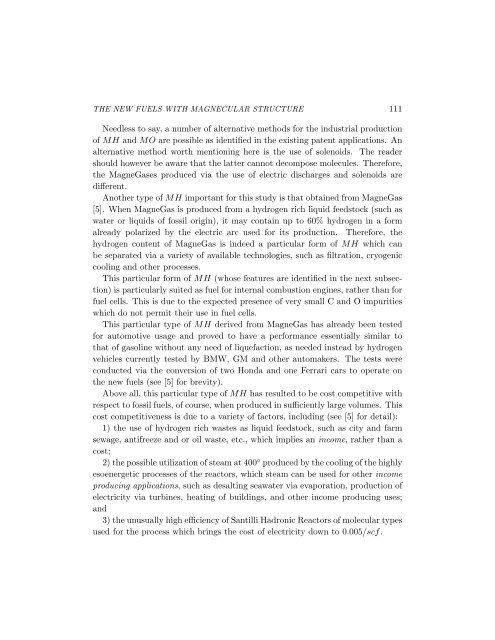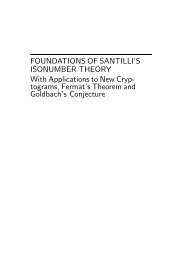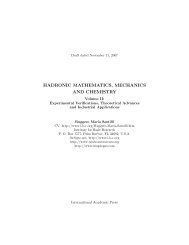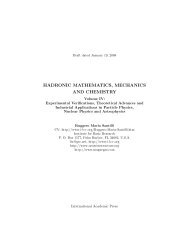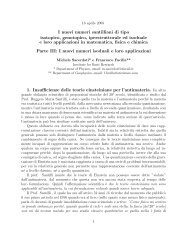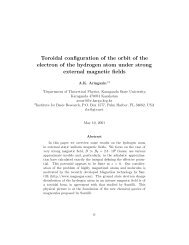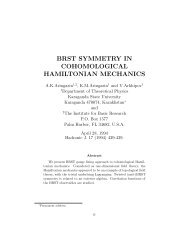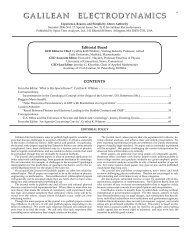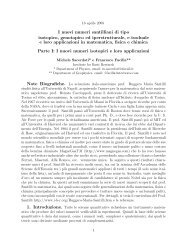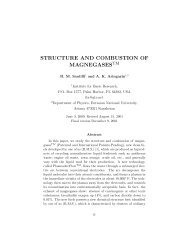the new fuels with magnecular structure - Institute for Basic Research
the new fuels with magnecular structure - Institute for Basic Research
the new fuels with magnecular structure - Institute for Basic Research
Create successful ePaper yourself
Turn your PDF publications into a flip-book with our unique Google optimized e-Paper software.
THE NEW FUELS WITH MAGNECULAR STRUCTURE 111<br />
Needless to say, a number of alternative methods <strong>for</strong> <strong>the</strong> industrial production<br />
of MH and MO are possible as identified in <strong>the</strong> existing patent applications. An<br />
alternative method worth mentioning here is <strong>the</strong> use of solenoids. The reader<br />
should however be aware that <strong>the</strong> latter cannot decompose molecules. There<strong>for</strong>e,<br />
<strong>the</strong> MagneGases produced via <strong>the</strong> use of electric discharges and solenoids are<br />
different.<br />
Ano<strong>the</strong>r type of MH important <strong>for</strong> this study is that obtained from MagneGas<br />
[5]. When MagneGas is produced from a hydrogen rich liquid feedstock (such as<br />
water or liquids of fossil origin), it may contain up to 60% hydrogen in a <strong>for</strong>m<br />
already polarized by <strong>the</strong> electric arc used <strong>for</strong> its production. There<strong>for</strong>e, <strong>the</strong><br />
hydrogen content of MagneGas is indeed a particular <strong>for</strong>m of MH which can<br />
be separated via a variety of available technologies, such as filtration, cryogenic<br />
cooling and o<strong>the</strong>r processes.<br />
This particular <strong>for</strong>m of MH (whose features are identified in <strong>the</strong> next subsection)<br />
is particularly suited as fuel <strong>for</strong> internal combustion engines, ra<strong>the</strong>r than <strong>for</strong><br />
fuel cells. This is due to <strong>the</strong> expected presence of very small C and O impurities<br />
which do not permit <strong>the</strong>ir use in fuel cells.<br />
This particular type of MH derived from MagneGas has already been tested<br />
<strong>for</strong> automotive usage and proved to have a per<strong>for</strong>mance essentially similar to<br />
that of gasoline <strong>with</strong>out any need of liquefaction, as needed instead by hydrogen<br />
vehicles currently tested by BMW, GM and o<strong>the</strong>r automakers. The tests were<br />
conducted via <strong>the</strong> conversion of two Honda and one Ferrari cars to operate on<br />
<strong>the</strong> <strong>new</strong> <strong>fuels</strong> (see [5] <strong>for</strong> brevity).<br />
Above all, this particular type of MH has resulted to be cost competitive <strong>with</strong><br />
respect to fossil <strong>fuels</strong>, of course, when produced in sufficiently large volumes. This<br />
cost competitiveness is due to a variety of factors, including (see [5] <strong>for</strong> detail):<br />
1) <strong>the</strong> use of hydrogen rich wastes as liquid feedstock, such as city and farm<br />
sewage, antifreeze and or oil waste, etc., which implies an income, ra<strong>the</strong>r than a<br />
cost;<br />
2) <strong>the</strong> possible utilization of steam at 400 ◦ produced by <strong>the</strong> cooling of <strong>the</strong> highly<br />
esoenergetic processes of <strong>the</strong> reactors, which steam can be used <strong>for</strong> o<strong>the</strong>r income<br />
producing applications, such as desalting seawater via evaporation, production of<br />
electricity via turbines, heating of buildings, and o<strong>the</strong>r income producing uses;<br />
and<br />
3) <strong>the</strong> unusually high efficiency of Santilli Hadronic Reactors of molecular types<br />
used <strong>for</strong> <strong>the</strong> process which brings <strong>the</strong> cost of electricity down to 0.005/scf.


